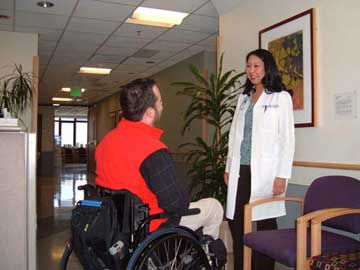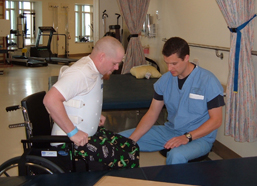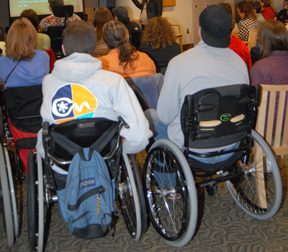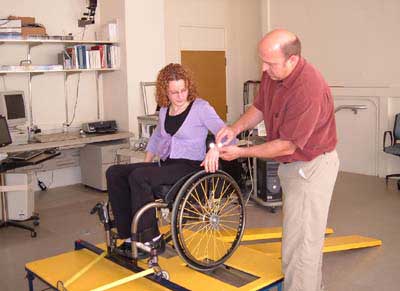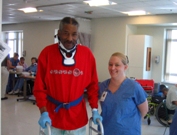SCI Forum
Taking Care of Business: Your Bowel Program
Presented on October 8, 2013 at the University of Washington Medical Center, Seattle, WA.
Most people with spinal cord injuries have changes in bowel function and are not able to empty their bowels normally. Newly injured individuals must learn how to use medications, diet, timing and other means to avoid incontinence or constipation, empty their bowels predictably, prevent medical complications, and feel confident out in the community. Learn about bowel problems and solutions at this Forum featuring an overview by Beth Hall, RN, rehab nurse at Harborview Medical Center, followed by a panel of individuals with SCI discussing their different bowel management situations. Watch the video below or read the report.
After watching the video, please complete our two-minute survey!
Presentation time: 72 minutes. You can also watch this video on YouTube.
See all of our streaming videos at http://sci.washington.edu/info/forums/forum_videos.asp.
Report
Contents
- Introduction: What is a Successful Bowel Program?
- Types of bowel dysfunction
- What are the different parts of a bowel program?
- Common problems
- Additional options
- Cancer Screening
- Final thoughts
- Resources
Introduction
One of the unfortunate complications of a spinal cord injury is damage to the nerves that allow a person to control bowel movements, called “neurogenic bowel.” After injury, most people need to adopt a new method of emptying their bowels that is safe and effective. The term “bowel program” refers to the method a person uses to accomplish this task.
People with SCI repeatedly rate bowel dysfunction as one of the most distressing aspects of spinal cord injury. A successful bowel program is very important for a good quality of life.
A successful bowel program is:
- Healthy and safe
- Avoids constipation.
- Avoids accidents that can damage skin.
- Can be sustained without causing medical problems.
- Acceptable and dependable
- Avoids embarrassment
- Not too time-consuming
- Doesn’t interfere with activities
A bowel program must be individualized to a person’s particular injury, type of bowel dysfunction, medical conditions and lifestyle.
Types of bowel dysfunction
What type of bowel dysfunction you have depends on your level and completeness of injury.
- Reflexic (injury above sacral segments—T12 and above): stool will not exit the rectum without stimulation. Since anal reflexes stay intact, defecation can be triggered by stimulating the rectum (using a finger or device) to open the anal sphincter so stool comes out.
- Areflexic (injury to sacral segments—T12 and below): the rectum has lost reflexes and tone and stool can leak out, so stool needs to be removed manually one to three times a day.
Incomplete: At any level, an incomplete injury may allow partial or normal control over bowel movements.
What are the different parts of a bowel program?
- Diet
Adequate fiber is necessary (15-20 grams of fiber daily) to keep stool from becoming too hard (constipation). Too much fiber, however, can lead to bloating, gas and pain. How much fiber you needed before injury is the best indicator of what you will need after SCI.
- Fluids
Enough fluids are needed for good stool consistency. Some studies recommend 40 ml per kilogram of body weight per day plus 500 ml more. For a large person this can add up to four liters, which is too much for ideal bladder management. Other studies suggest 1.5 liters/day.
- Bowel care
This is the procedure for emptying the bowel and consists of chemical or mechanical (such as digital) stimulation of defecation, positioning, assistive techniques and equipment.
- Medications
Stool softeners and bulking agents help regulate stool consistency. Chemical rectal stimulants (suppositories) and laxatives promote bowel motility. These may or may not be necessary depending on individual needs.
- Schedule
Bowel care should occur at the same time of day to develop a predictable response and frequently enough to avoid an over-full colon, which can cause a host of problems over time. Eating food or drinking warm liquids approximately 30 minutes before bowel care can help to stimulate the reflex that moves stool through the colon.
Keep records
When first establishing a bowel program or when difficulties come up, keep a record of all aspects of your bowel care: timing, position, medications and stimulation method (stool softeners, suppositories, etc.), assistive techniques (abdominal massage, pushups, etc.), stool results (amount, firmness/softness), incontinence episodes, and diet. This information can help you pinpoint what you might need to change to improve results. Only change one component at a time so you can understand what effect the changes might have.
Common problems
Constipation
People with SCI have slower passage of stool through the system and often take medications that have a constipating effect, so it is no surprise that constipation is a common problem.
Symptoms: Bowel care takes too long; small quantity of stool is produced; stools are dry and hard; or there has been no bowel movement for more than three days.
When symptoms first start, try the following:
- Increase fluids and activity.
- Do daily bowel care if you usually do it every other day.
- Add or increase stool softener.
If things don’t improve after three days, you may try adding or increasing a laxative. Untreated and prolonged constipation can lead to fecal impaction.
Fecal impaction
Symptoms: No stool or small amounts of liquid stool for days because hard, dry stool is stuck in the colon.
What to do:
- Follow the steps for constipation, above, and take 1 oz. mineral oil.
- If no stool is produced within 24 hours of taking mineral oil, or if abdominal pain and distention develop, see your health care provider.
Hemorrhoids
Symptoms: Swollen rectal veins that bleed during bowel care routine. They can be caused by damage from suppositories, enemas, or digital stimulation.
What to do: If they cause bleeding, pain, mucus accidents or autonomic dysreflexia (AD), try these steps:
- Use a stool softer.
- Change to a milder stimulant.
- Do gentler and/or fewer digitals.
- Use hemorrhoid creams, ointments or suppositories.
- If these do not work, discuss hemorrhoid removal surgery with your health provider.
Autonomic dysreflexia (AD) during bowel care
- Follow steps for hemorrhoids, above, and use xylocaine jelly for lubrication (requires a prescription).
- Know the symptoms of AD and what to do about it
Bowel program takes too long
- Make dietary changes and increase physical activity.
- Sit up for bowel care.
- Keep stool softer.
- Change stimulant—mini-enemas work more quickly than suppositories.
- Do bowel care more often.
Accidents
- Hold off on softeners and laxatives if stool is too soft.
- Change type or amount of stimulant.
- Identify possible triggers—Was it something you ate? Have you been ill? Are you taking an antibiotic or new medication? Do you need to do bowel care more often?
Diarrhea
- Stop taking softeners and laxatives until diarrhea has stopped.
- Stay hydrated.
- Try the BRAT diet (bananas, rice, applesauce, toast) to allow gut to rest.
- Take Immodium for a day or two (no more).
- Contact your health care provider if:
- Diarrhea is severe.
- Diarrhea lasts more than two days.
- You are ill.
- You have recently taken antibiotics.
- Diarrhea is severe.
Mucous accidents
- Switch to a different suppository or mini-enema.
- Use fewer, gentler digitals.
A word about laxatives
Although regular use of laxatives by people with SCI is common, you need to be cautious. A health care provider should supervise the use of laxatives because of possible negative side effects. Longtime use of some kinds of laxatives can even worsen the problem they were used to treat in the first place.
Additional Options
Transanal irrigation (Peristeen® by Coloplast)
This is a promising new method that introduces water into the bowel using a rectal catheter, causing stool to come out. It is designed to be “quad-friendly” and has been shown to reduce constipation, incontinence and time needed to produce a bowel movement. It has recently become available in the US after years of use in Europe, but may not be covered by all insurance companies. Find out more at www.coloplast.com (enter “peristeen” in the search box).
Colostomy
A surgical procedure that connects the colon to the surface of the abdomen, providing a new path for stool and gas to leave the body. This can be a good option for people whose bowel care has become unacceptable (takes too long or too many accidents) or causes health problems.
Cancer screening
People with SCI do not have an increased risk for colon cancer. Therefore, you should follow the same screening guidelines as for the general population.
Final thoughts
It takes a period of trial and error and working with your rehab provider to arrive at the specific bowel program that works for you. Furthermore, your bowel management needs may change over time and as you age. Regular visits with your rehab provider can help you monitor and address those changes as they arise.

